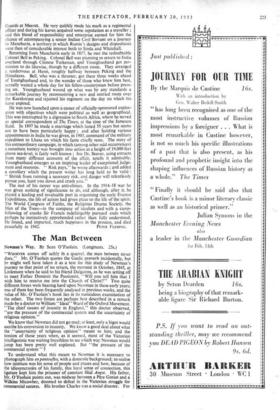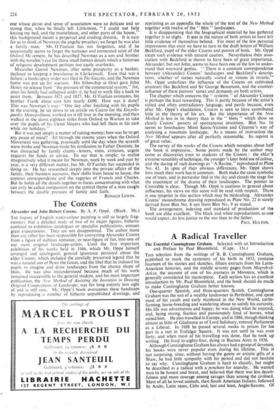The Man Between
Newman's Way. By Sean 0 'Faolain. (Longmans. 25s.) "WHOEVER comes off safely in a quarrel, the man between never does." Mr. O'Faolain quotes the Gaelic proverb incidentally, but he might well have taken it as a text for this study of Newman's journey to that point of no return, the moment in October, 1845, at Littlemore when he said to his friend Dalgairns, as he was setting off to meet Father Dominic the Passionist, "Will you tell him that I wish him to receive me into the Church of Christ?" Two quite different forces were bearing hard upon Newman in these early years; one of them has been frequently analysed in previous works, and the value of Mr. O'Faolain's book lies in its meticulous examination of the ether. The two forces are perhaps best described in a remark made by a doctor to William "Ideal" Ward of the Oxford Movement. "The chief causes of insanity in England," this doctor observed, "are the pressure of the commercial system and the uncertainty of religious opinion."
We know that Newman did not go mad; at least, only a bigot would ascribe his conversion to insanity. We know a good deal about what the "uncertainty of religious opinion" meant to him; and the tension of those years when, as it seemed, most of the Victorian intelligentsia was waiting breathless to see which way Newman would jump has been pretty well explored. But "the pressure of the commercial system" ?
To understand what this meant to Newman it is necessary to photograph him en pantoufles, with a domestic background; to realise how intimate was his sense of people and places and how, because of the idiosyncrasies of his family, this loyal sense of connection, this ligature kept him the prisoner of constant filial Angst. His father, Mr. O'Faolain points out, was midway between a Pere Goriot and a Wilkins Micawber, doomed to defeat in the Victorian struggle for commercial success. His brother Charles was a social disaster. For one whose pietas and sense of association were so delicate and so strong that, when he finally left Littlemore, "I could not help kissing my bed, and the mantelpiece, and other parts of the house," this background meant a perpetual and eroding distress. It is easy for us to think of Newman the angelic preacher; we forget he was also a family man. Mr. O'Faolain has not forgotten, and if he occasionally seems to forget the tortuous and tormented saint of the Oxford Mc cement, he has described Newman as a son and brother with the novelist's eye for those small human details which a historian of religious development perhaps too'easily overlooks.
Micawber Goriot Newman, after some prosperity as a banker, declined to keeping a brewhouse in Clerkenwell. Even that was a failure; a bankruptcy order was filed in The Gazette, and the Newman home was put up for auction. His fellowship at Oriel gave John Henry no release from " the pressure of the commercial system," for, since his family had collapsed under it, he had to work like a hack to assist them. Between 1821 and 1827, Mr. O'Faolain estimates, his brother Frank alone cost him nearly £600. How was it done? This was Newman's way: One day after finishing with his pupils in the evening, he sat down to an article on Cicero for the Encyclo- paedia Metropolitana, worked on it till four in the morning, and then walked in the dawn eighteen miles from Oxford to Worton to take over the pupils of his friend Mayets who had left them in his care while on holidays."
But it was not simply a matter of raising money; how was he to get any peace of mind? All through the stormy years when the Oxford Movement was gathering, practically until the day when the seventh wave broke and Newman made his confession to Father Dominic, he was distracted by family claims—letters, visits, criticism, urgent requests for funds or advice. To say that is simple; to realise imaginatively what it meant for Newman, week by week and year by year, is a very different matter, but Mr. O'Faolain has succeeded in doing so. He has researched deeply into the private affairs of the family, their business accounts, their shifts from house to house, the copious correspondence and the vagaries of Francis and Charles. But he holds all the details together in focus, concentrating with what can only be called compassion on the central theme of a man caught between the double pressure of family and faith.
RONALD LEWIN.



































 Previous page
Previous page